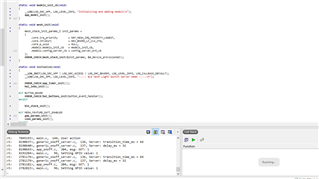hi..... i am using nRF52832 and segger latest version 3.1 mesh sdk
i am trying to send the message from client to server side using light switch example , I have made some changes in light switch client example ,i have changed the boolen(APP_STATE_ON ,OFF) to character and then flashed , scanned , provisioned successfully but how to check my messages have transmitted or not ?
where can i see ? can we able to print the received messages in server side . here is my code ,where i have assign a character and sent to server side
client side
static void button_event_handler(uint32_t button_number)
{
__LOG(LOG_SRC_APP, LOG_LEVEL_INFO, "Button %u pressed\n", button_number);
uint32_t status = NRF_SUCCESS;
generic_onoff_set_params_t set_params;
model_transition_t transition_params;
static uint8_t tid = 0;
/* Button 1: On, Button 2: Off, Client[0]
* Button 2: On, Button 3: Off, Client[1]
*/
char arr[5] = "code";
char ara[5] = "set";
switch(button_number)
{
case 0:
case 2:
set_params.on_off = arr;
break;
case 1:
case 3:
set_params.on_off = Ara;
break;
}
debug terminal(client side )



